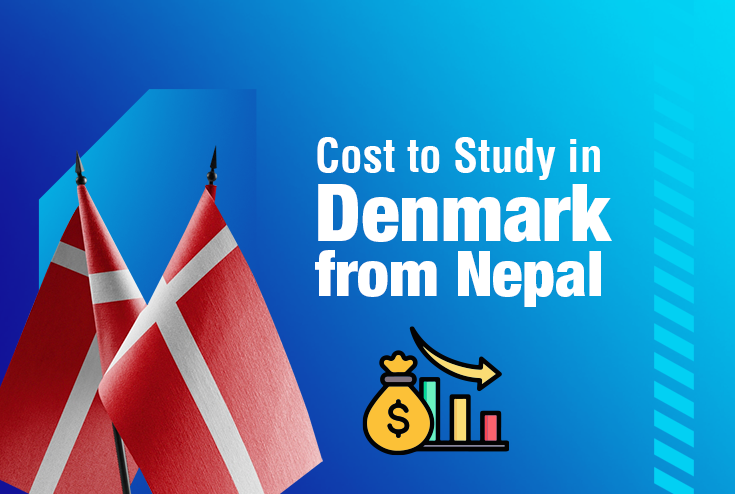.png)

Denmark, known for its progressive education system, high quality of life, and rich cultural heritage, is becoming an increasingly attractive destination for Nepali students seeking world-class higher education. While the idea of studying in Denmark is exciting, understanding the financial costs is crucial for proper financial planning.
This comprehensive guide will cover all aspects of the cost to study in Denmark from Nepal, including tuition fees, living expenses, visa costs, health insurance, accommodation, and tips on budgeting and scholarships.
Table of Contents
Cost to Study in Denmark from Nepal 2025
Before diving into the relevant costs in Denmark, let’s understand why Denmark has emerged as one of the top choice for international students, including Nepal:
Denmark’s education system is one of the best in the world due to its student-centred approach that focuses on analytical thinking, creativity, collaboration, and hands-on learning. It is also home to some of the best universities in the world like the University of Copenhagen, Aarhus University, etc. The research opportunities and practical exposure offered to the students prepare them for the real world challenges and prepare them for the workspace.
Although Danish is the national language, over 700 study programs are offered in English, for the Bachelor’s, Master’s, and PhD levels. This allows international students, including those from Nepal, to pursue their education without a language barrier.
Danish universities attract thousands of students from around the world every year, making for a truly global classroom. Students engage with peers from different cultures, perspectives, and academic backgrounds.
This allows students to not only gain international work experience but also helps offset the cost of living.
Once you are registered in Denmark with a CPR (Civil Personal Registration) number, you get access to free public healthcare, including doctor visits, hospital care, and emergency treatment. This removes a significant financial burden, as healthcare costs are high in many other countries.
Although competitive, Denmark offers pathways to permanent residence and citizenship for students who:
This is a big attraction for those planning long-term international careers or settlement in Europe.
The Danish student visa success rate from Nepal ranges from 70% to 90%, making it one of the most achievable European destinations.
Denmark is consistently ranked among the top countries for quality of life, thanks to its:
Copenhagen, Aarhus, and Odense are known for being safe, bicycle-friendly, and culturally vibrant student cities.
The table below will help you to understand the financial costs under different categories in Denmark for international students, including students from Nepal:
|
Categories |
Annual Costs (in DKK) |
Annual Costs (in NPR - approx.) |
|---|---|---|
|
Tuition Fees |
45,000 - 120,000 |
850,000 - 2,300,000 |
|
Accommodation |
30,000 - 60,000 |
570,000 - 1,140,000 |
|
Food & Groceries |
24,000 - 36,000 |
456,000 - 684,000 |
|
Transportation |
3,600 - 7,200 |
68,400 - 136,800 |
|
Health Insurance |
0 - 4,000 |
0 - 76,000 |
|
Visa Fees |
1,890 (one time pay) |
36,000 |
|
Miscellaneous |
6,000 - 12,000 |
114,000 - 228,000 |
Note: Exchange rate used: 1 DKK ≈ 19 NPR (Subject to change)
Denmark offers free education to EU/EEA and Swiss students, but international students from Nepal are required to pay tuition fees.
Top Universities and Fees
Note: For exact tuition fee estimates, please visit your university’s official websites.
Denmark is known for its high living standards, which also means higher costs of living. However, students can manage well with budgeting.
This includes rent, food, transport, books, and leisure.
Types of Accommodation:
Most students opt for shared or dormitory-style housing due to affordability and convenience.
How to Find Accommodation in Denmark
Note: Always book early - accommodations fill up quickly, especially before the semester starts.
Cooking at home is much cheaper than eating out. You can also find Asian and South Asian grocery stores for familiar foods.
Bicycles are widely used and a cost-effective option. Students get discounts on public transport.
Students who stay for more than 3 months and have a CPR number are entitled to free public healthcare. Short-term students must buy private insurance costing DKK 2,000 – 4,000 per year.
This is a one-time cost paid during the application process. Students also need to submit proof of financial resources (approx. DKK 6,397/month for 12 months = DKK 76,764).
Students often spend on books, entertainment, clothing, and mobile services.
There are several scholarship opportunities offered to international students and the students can also be involved in some part-time jobs to help offset living costs and gain valuable work experience.
The details of these opportunities are explained below:
Studying in Denmark can be expensive, but there are several scholarships that can ease the financial burden.
Many public universities offer scholarships for international students funded by internal or external donors.
Examples include:
Some private organizations and NGOs also offer financial assistance based on merit or need.
Minimum Wage: DKK 110 – 130/hour
Working part-time can help cover living expenses but is unlikely to pay full tuition.
Note: You must apply for a tax card (skattekort) and CPR number to start working legally.
Denmark offers an exceptional educational environment for Nepali students, but it comes with a significant financial commitment. On average, a Nepali student might spend between NPR 3.2 to 4.5 million per year, depending on the course, city, and lifestyle. With smart budgeting, part-time work, and potential scholarships, studying in Denmark can be a rewarding and life-changing experience.
Need help planning your study in Denmark? We're here to guide you every step of the way! We offer:
As one of Nepal’s leading consultancies for Denmark, we take pride in our student-first approach, experienced team, and successful placements. You may also explore more details regarding Denmark student visa requirements here.
To get in touch with us click here!
Let’s make your dream of studying in Denmark a reality — explore our services today!
1. How much GPA is required to study in Denmark from Nepal?
To study in Denmark, a GPA of 3.0 or higher on a 4.0 scale is generally preferred, though it can vary by university and program.
2. How much IELTS score is required for Denmark?
The minimum IELTS score required for studying in Denmark typically ranges from 6.0 to 6.5 for undergraduate programs and 6.5 to 7.0 for postgraduate programs.
3. What is the success rate of a visa for Denmark from Nepal?
The Danish student visa success rate from Nepal ranges from 70% to 90%.
4. Is gap accepted in Denmark?
The Danish Universities generally accept 2-3 years of educational gap with proper justification and documents.
5. Can I go to Denmark without IELTS?
Yes, you can! Many Danish universities accept international students without IELTS if they meet alternative criteria (TOEFL, PTE, MOI, etc.).
6. Is it hard to get admission in Denmark?
You don't need to worry: applying to a university in Denmark is easy and we are more than willing to help you. You can reach out to us!
7. Is it easy to get PR in Denmark after studying?
Yes, it is easy to get PR in Denmark. If you complete a higher education program in Denmark, you can be granted a residence permit of six months to look for work. The job-seeking period allows you to find a job in Denmark after your studies. After a certain number of years working in Denmark (typically 4 - 8 years), you can be eligible for permanent residency.
8. PTE requirements in Denmark?
PTE scores of 58-65 are often acceptable for undergraduate studies, and 65-75 for postgraduate studies.
9. How much bank balance is required to study in Denmark from Nepal?
You need to demonstrate proof of sufficient funds (approx. DKK 6,590/month or NPR 137,000/month for 12 months).
10. How much does it cost to study in Denmark from Nepal?
Studying in Denmark from Nepal involves both tuition fees and living expenses. Tuition fees for non-EU/EEA students typically range from DKK 45,000 - DKK 120,000 per year, while living expenses can average around DKK 30,000 - DKK 60,000 per month. This amount does not include any scholarships and may vary based on specific universities and their location.
Also Read

Are you dreaming of studying information technology in one of the world's most technologically a...
Read MoreAre you dreaming of pursuing business education in one of the world's most advanced economies? J...
Read More
Every year, more than 240,000 international students choose Japan for higher education, and a rising...
Read More
Japan is increasingly becoming a top destination for higher education among Nepalese students. With...
Read More

Begin a transforming journey with Asahi and
Take off with
passion and self-assurance.
ⓒCopyright 2025 Asahi . All rights reserved | Powered By:Communicate